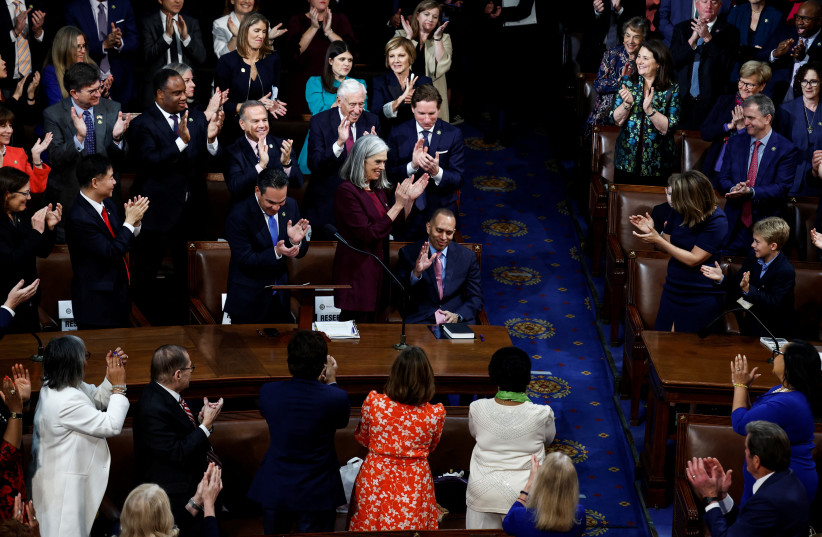WASHINGTON – House Republican leader Kevin McCarthy has lost the first round of votes to become the next speaker of the House of Representatives. It was the first time since 1923 that the House did not elect a speaker at the first round of votes.
McCarthy faced fierce opposition from within the Republican caucus, as 19 members defected – ten voted for Rep. Andy Biggs of Arizona, and nine members voted for others.
As a result, Democratic leader Hakeem Jeffries, who received all his caucus’ votes, finished first with 212 – not enough to cross the 218 threshold and hold the gavel. McCarthy arrived second with just 203 votes out of the Republicans’ 222.
The House then moved to a second round of vote – but the result did not change. Democratic Representative Jeffries finished again with 212 votes and McCarthy arrived second again with 203, while Republican Jim Jordan of Ohio received 19 votes and arrived third.
The path for McCarthy remained complicated, as popular conservative Representative Jim Jordan sought to rally support for the California Republican only to find himself put forward as a rival by a McCarthy opponent.

"We need to rally around him," Jordan said in an impassioned speech on the House floor. "I think Kevin McCarthy's the right guy to lead us."
Hardline conservative Representative Matt Gaetz then nominated Jordan, who quickly attracted enough Republican votes to deny McCarthy victory on the second ballot.
Jordan, 58, is a staunch ally of Republican former President Donald Trump and a co-founder of the conservative House Freedom Caucus. A former amateur wrestler who represents a congressional district in Ohio, Jordan had been floated as a possible alternative candidate for speaker but instead supported McCarthy while preparing to oversee the House Judiciary Committee's investigation of the Justice Department and FBI under Democratic President Joe Biden.
It was a disconcerting start to the new majority for McCarthy and highlights the challenges Republicans could face over the next two years, heading into the 2024 presidential election. Their slim majority gives greater clout to a small group of hard-liners, who want to focus on dealing defeat to Democrats and pushing various investigations.
Republicans won a narrow 222-212 majority in November's midterm election, meaning that McCarthy - or any candidate for speaker - will need to unify a fractious caucus to win the gavel. Democrats hold a slim majority in the Senate.
Culture wars
McCarthy's hardline opponents are concerned that he is less deeply vested in the culture wars and partisan rivalries that have dominated the House - and even more so since fellow Republican Donald Trump's White House years.
Before the vote, McCarthy tried to persuade the holdouts in at a closed-door party meeting, vowing to stay in the race until he gets the necessary votes, but many participants emerged from the gathering undaunted.
A protracted speaker election could undermine House Republican hopes of moving forward quickly on priorities including potentially damaging investigations of Democratic President Joe Biden's administration and family, as well as legislative priorities involving the economy, US energy independence and border security.
A few Republicans opted to vote for party figures not on the ballot, including for conservative leader Representative Jim Jordan and Lee Zeldin, a former House Republican who ran for governor of New York last year.
A standoff would leave the House largely paralyzed and could force lawmakers to consider another candidate. Incoming Majority Leader Steve Scalise and Jordan are seen as possibilities.
A slim Republican majority
It was a disconcerting start to the new majority for McCarthy and highlights the challenges Republicans could face over the next two years, heading into the 2024 presidential election. Their slim majority gives greater clout to a small group of hard-liners, who want to focus on dealing defeat to Democrats and pushing investigations.
It was not clear whether McCarthy, who has the support of a wide majority of his caucus, would have the support to overcome the hard-line opposition and win the speakership.
McCarthy, who represents a California district in the House, has spent his adult life in politics - as a congressional staffer, then state legislator before being elected to the House in 2006. As speaker, McCarthy would be well placed to frustrate Biden's legislative ambitions.
But any Republican speaker will have the tough task of managing a House Republican caucus moving ever rightward, with uncompromising tendencies and - at least among some lawmakers - close allegiances to former President Donald Trump.
Tuesday's vote marked the first time in 100 years that a nominee has not succeeded to the House speakership on the first ballot. The record number of voting rounds to elect a House speaker is 133 over a two-month period in the 1850s.
The Democrats have picked Jeffries to serve as minority leader after Pelosi, the first woman to serve as speaker, announced that she would step down from her leadership role. She will remain in office as a representative.
This is a developing story.
